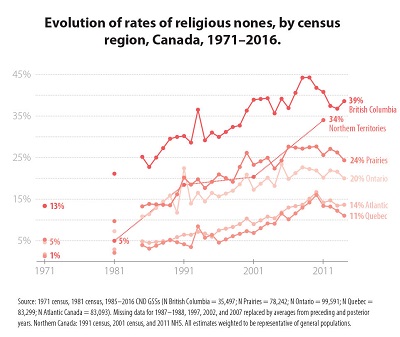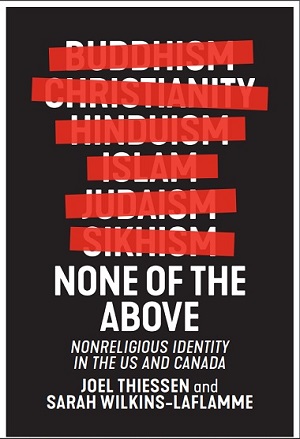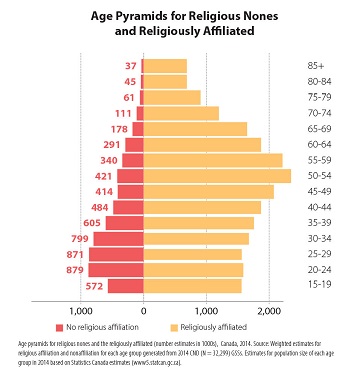 Joel Thiessen wrote this piece for The Christian and Missionary Alliance in Canada, building on his recent book None of the Above.
Joel Thiessen wrote this piece for The Christian and Missionary Alliance in Canada, building on his recent book None of the Above.
‘Religious nones’ – those who say they have no religion – are the fastest growing ‘religious group’ in Canada, along with many other modern Western nations.
Religious nones currently comprise approximately one-quarter of the Canadian adult population and one-third of Canada’s young people.
As you might imagine, regional variations exist. Nearly 40 percent of those in British Columbia say they have no religion, followed by 34 percent in the Northern Territories, one-quarter in the Prairies (led by Alberta), one-fifth of those in Ontario, 14 percent in the Maritimes, and 11 percent in Quebec.
How do you react to this data? What is the first thing that comes to mind when you hear the phrase “religious nones?” What do you know about religious nones? Do you generally have positive or negative perceptions or experiences of religious nones? How does your church talk, implicitly or explicitly, about religious nones? What is your personal or collective theological response to and engagement with religious nones?
 I recently co-authored a book on religious nones with Dr. Sarah Wilkins-Laflamme (University of Waterloo) for New York University Press – None of the Above: Nonreligious Identity in the US and Canada. In our book we explore who religious nones are, why and where they are growing, and what impact they are having on today’s societal and political trends.
I recently co-authored a book on religious nones with Dr. Sarah Wilkins-Laflamme (University of Waterloo) for New York University Press – None of the Above: Nonreligious Identity in the US and Canada. In our book we explore who religious nones are, why and where they are growing, and what impact they are having on today’s societal and political trends.
I am interested in this topic both as a sociologist of religion and as someone deeply committed to my Christian faith and the local church.
As a social scientist, I maintain that data matters and tells us something about social reality; data helps to dispel misconceptions and myths that people hold which are not, in fact, true.
And then, theologically and practically, I wonder what the growth of religious nones means for evangelical Christians and congregations especially, with their value for evangelism.
To provide a snapshot of religious nones in Canada, here are seven data-driven findings among many others in our research…
1. Most religious nones were raised in Christian homes; however, more and more religious nones are being raised in nonreligious homes altogether. Sociologists call this irreligious or nonreligious socialization. In the years ahead we should anticipate a growth in religious nones with no religious upbringing or exposure.
2. Opposition to exclusive religious beliefs and practices as well as the strong fusion between the Christian Right and Conservative politics are leading reasons, among others, for why many have set aside their religious affiliation and involvement.
 3. There is relatively little social stigma associated with saying that one has no religion in Canada today. The same is not true in the United States, particularly in evangelical stronghold states, where religious nones fear ‘coming out’ to their family, friends, neighbours and coworkers.
3. There is relatively little social stigma associated with saying that one has no religion in Canada today. The same is not true in the United States, particularly in evangelical stronghold states, where religious nones fear ‘coming out’ to their family, friends, neighbours and coworkers.
4. Not all, or even most, religious nones are atheists, nor are most “spiritual but not religious.” Religious nones are a diverse population, with a range of attitudes and behaviours regarding the existence of a supernatural being, the afterlife, meaning and purpose in life, prayer, and other markers of religion and spirituality. For example, over half of religious nones are ‘inactive nonbelievers,’ showing no sign of religious or spiritual belief or practice, while about one-quarter consider themselves ‘spiritual but not religious.’
5. When examining a range of social and moral issues such as abortion, same-sex marriage, women in the workforce, the environment, government aid for the poor, and immigration policy, religious nones are more left-leaning than religious affiliates, especially in regions with higher proportions of religious nones.
6. Religious nones – atheists in particular – and evangelicals do not generally look upon one another in a positive light. Moreover, while atheists do hold many favourable views toward some religious groups such as Buddhists, Hindus or Jews, evangelicals tend to hold predominantly negative views toward every (non)religious group outside of Christianity.
7. The vast majority of religious nones are very content with their lives and religiously unaffiliated status; they are not clamouring to turn to God or join a religious group. Strengthened preaching, music or programs do not generally draw in religious nones. Rather, such efforts primarily help to retain those already in congregations or contribute to transfer growth from other churches.
Do these findings surprise you or affirm what you already suspected was the case? For those in local churches, what should you make of these data and possibly do (or not do) in response? I offer three invitations.
First, learn more about religious nones, turning to sound empirical data rather than well-intentioned anecdotes, opinions or platitudes. Akin to missionaries who learn the language and values of another culture when entering new terrain, Canadian churches are in a shifting landscape that warrants careful study.
I beg you, do not live in a world of narratives based on how you wish things were; understand the landscape as it is, and then proceed accordingly.
Second, meaningfully interact with religious nones in your midst and pursue bridge building activities around common interests. Sociological research reveals that our perceptions of others tend to change as a result of our interactions with them.
Too often it seems that evangelical Christians in particular have misguided perceptions of religious nones because of very little interaction with those outside ‘the fold’ – a problematic reality for those who claim to believe in the ‘good news.’
So, are you in relationship with religious nones – family, neighbours or coworkers, perhaps? Listen to and learn from them, on how they view and experience the world. Pay attention to common interests such as caring for the ‘least of these,’ and consider ways to tangibly partner together.
Third, the number one reason a person joins a religious group is because someone personally invites them. Comparatively speaking, evangelicals have a better track record in this regard than other traditions. Still, few religious nones will necessarily be open to such an invitation, but research shows that some are.
I encourage you to be attentive and open to this possibility of inviting someone into a strategic and appropriate next step in their faith journey with the living God. Out of an informed posture on religious nones in Canada, and in the context of relationships that have been mutually nurtured and valued over time, where might an invitation possibly make sense?

Joel Thiessen
Joel Thiessen is a sociology professor and the director of the Flourishing Congregations Institute at Ambrose University in Calgary.
He has authored or co-authored several books, including None of the Above: Nonreligious Identity in the US and Canada, The Millennial Mosaic: How Pluralism and Choice Are Shaping Canadian Youth and The Future of Canada and The Meaning of Sunday: The Practice of Belief in Secular Age.
For more information, visit joelthiessen.ca
This comment is re-posted here by permission of the author.

“. . . evangelicals tend to hold predominantly negative views toward every (non)religious group outside of Christianity.”
The “religions” perhaps. The people, very often, no. There is an enormous difference.
Curious Joel, were your grandparents part of the Mennonite church?